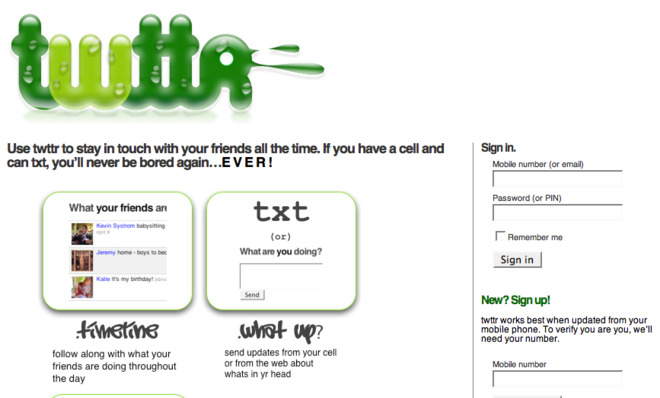3 descriptions of 'Twttr' when it first launched in 2006
"I think the beauty of Twitter lies in how it doesn't preordain how it should be used."

A free daily email with the biggest news stories of the day – and the best features from TheWeek.com
You are now subscribed
Your newsletter sign-up was successful
A long time ago, in a galaxy far, far away, the service we now call Twitter was a clumsy little SMS service that allowed users to message more than one person at a time. Today it's a global broadcast system for close to 300 million users, where everyone from @BarackObama to @JustinBieber to @WeedBro420 can capture an audience or hold a conversation if they'd like.
But here, on Twitter's big IPO day, we thought it'd be fun to revisit how some tech bloggers described the service back when it first launched in 2006. Remember, this is before most smartphones had touchscreens.
Here are TechCrunch founder Michael Arrington's first impressions of "twttr" when the service launched in July 2006. He found the idea "interesting":
The Week
Escape your echo chamber. Get the facts behind the news, plus analysis from multiple perspectives.

Sign up for The Week's Free Newsletters
From our morning news briefing to a weekly Good News Newsletter, get the best of The Week delivered directly to your inbox.
From our morning news briefing to a weekly Good News Newsletter, get the best of The Week delivered directly to your inbox.
Odeo released a new service today called Twttr, which is a sort of "group send" SMS application. Each person controls their own network of friends. When any of them send a text message to "40404," all of his or her friends see the message via sms. This launched officially today, and a few select insiders were playing with the service at the Valleyschwag party in San Francisco last night.
People are using it to send messages like "Cleaning my apartment" and "Hungry". You can also add friends via text message, nudge friends, etc. It really a social network around text messaging — and is very similar to another service called Dodgeball. [TechCrunch]
GigaOm's Om Malik, on the other hand, initially found it to be rather intrusive:
The annoying SMS messages from nocturnal friends is not the only thing which bothers me about this service, but also the fact, that the texting a message (reply) to twttr ends up on their website. Best thing is to allow users to create micro groups, and give users the options of picking topics and setting rules to maintain privacy and control over the service. If [Twitter co-founder Noah] Glass can do that, well, it [would] be pretty awesome. [GigaOm]
And finally — a few months later — here are some prescient insights from venture investor Chris Sacca, a former Googler whose impressive track record includes investments in Twitter, Uber, Instagram, and more:
Twitter enables the wide broadcast of anything one can fit into a text message. I tend to think of it as microblogging — blogging a sentence or two. A mobile and completely spontaneous and immediate channel for expressing the widest range of thoughts and experiences. Learn something startling? Deep thought shared with you? Need to vent a little? Anointed yourself the Fashion Police? Jam it into your phone or Blackberry and, instantly, your friends are all apprised...
I think the beauty of Twitter lies in how it doesn't preordain how it should be used. Rather than tell users what to message or what problem Twitter is solving, Twitter instead just offers a powerful platform then leaves the door wide open and the users themselves evolve its application. [Whatisleft.org]
A free daily email with the biggest news stories of the day – and the best features from TheWeek.com
-
 How to Get to Heaven from Belfast: a ‘highly entertaining ride’
How to Get to Heaven from Belfast: a ‘highly entertaining ride’The Week Recommends Mystery-comedy from the creator of Derry Girls should be ‘your new binge-watch’
-
 The 8 best TV shows of the 1960s
The 8 best TV shows of the 1960sThe standout shows of this decade take viewers from outer space to the Wild West
-
 Microdramas are booming
Microdramas are boomingUnder the radar Scroll to watch a whole movie